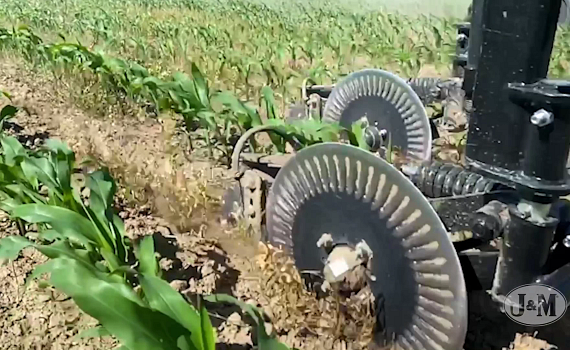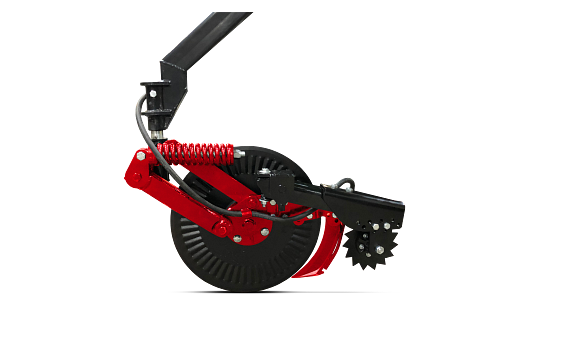2023 gold manus® – coulter
When farmers use nitrogen as a fertiliser, they often have to take advantage of narrow time slots in the crop's growing season. Every hour counts. Hence, it is annoying to first have to regrease hundreds of bearings before heading to the field. To save farmers this time, J&M Manufacturing, an American company, has developed a new type of applicator that works with lubrication-free and therefore maintenance-free igus polymer bearings. It won the golden manus award 2023, a competition in which igus honours the most sustainable and economical use of plain bearings made of high-performance plastic.
Profile
- What was needed: iglidur plain bearings
- Requirements: corrosion-free bearing points, problem-free contact with liquid nitrogen fertiliser, long service life despite oscillating movements, no use of lubricants
- Industry: Agricultural engineering
Problem
Many farmers rely on injection fertilisation so that maize, potatoes and wheat can grow well. They use ploughs to open up the soil and position liquid nitrogen fertiliser in close proximity to the plant roots. J&M Manufacturing is one of the manufacturers of these agricultural machines. The US company has developed the NitroGro applicator. It works as follows: a tank for liquid nitrogen is mounted in the middle of a tractor trailer. Two booms can be folded out to the right and left. Depending on the model, they are either almost 9 or 18m long. The heart of these booms consists of up to 37 para-linkage coulters that deliver the nitrogen to the soil precisely, ensuring a low loss rate.To design the new nitrogen fertilisation applicator so that it is more economical than competing models, the J&M Manufacturing engineers decided to use an alternative to classic bronze bushings for the system's pivot points. This addressed a problem that plagues many farmers: regreasing the plain bearings. Despite the grease nipples, which continuously supply lubricating grease to the bearing points, relubrication requires considerable effort. Austin Franz, a J&M Manufacturing Design Engineer, estimates that applying grease to a 25-row applicator with five grease nipples per row takes up to 52 minutes. That's almost an hour lost every day before work can begin in the field. Such a loss translates into lower earnings and profits. "In this time, not even counting the additional time for changing grease hoses and other things, farmers could work a large area," says Franz. "Farmers driving 13km per hour with a 25-row applicator can fertilise about one hectare of land per minute." Without lubrication, they can therefore manage 52 hectares more per day. In ten days, that's 520 additional hectares. "Much more than a day's nitrogen application."
Solution
To eliminate lubrication, the J&M Manufacturing designers use iglidur-G-series polymer plain bearings from igus, the motion plastics specialist, on all five of the coulter's pivot points. The key is microscopic solid lubricants that are integrated into the high-performance plastic and released during use for low-friction, environmentally friendly dry operation without a drop of lubricating grease. They eliminate the need for lubrication. Farmers can start work faster. The polymer bearings are also ideal for the field. While metal bearings' lubricating film often becomes a dirt magnet, combining with dust and dirt to form a mixture that negatively affects smooth bearing operation, polymer bearings are dirt-resistant. They are also environmentally friendly, since there is no risk of contamination, corrosion-free and resistant to media and extreme temperatures. Franz assumes that the applicators with igus polymer bearings will last at least seven years in field use. "This is the second year we're offering them. Over 95 per cent of the shares we have sold are para-linkage shares with igus polymer bearings."With the polymer bearings from Cologne, the engineers at J&M have also succeeded in realising a spring-loaded system with a parallel design in which the knife and blade remain parallel to the ground at the same height when engaged. Unlike the industry standard, where the knife is located behind the coulter and swings up out of the ground faster than the blade, this allows hardly any fertiliser to escape into the atmosphere. This is a very important point since nitrogen turns into nitrous oxide and contributes to the greenhouse effect. "The only option on the market was very expensive. Therefore, the main goal of the design was to build a coulter that reduces fertiliser loss due to evaporation at a reasonable cost," says Franz.

